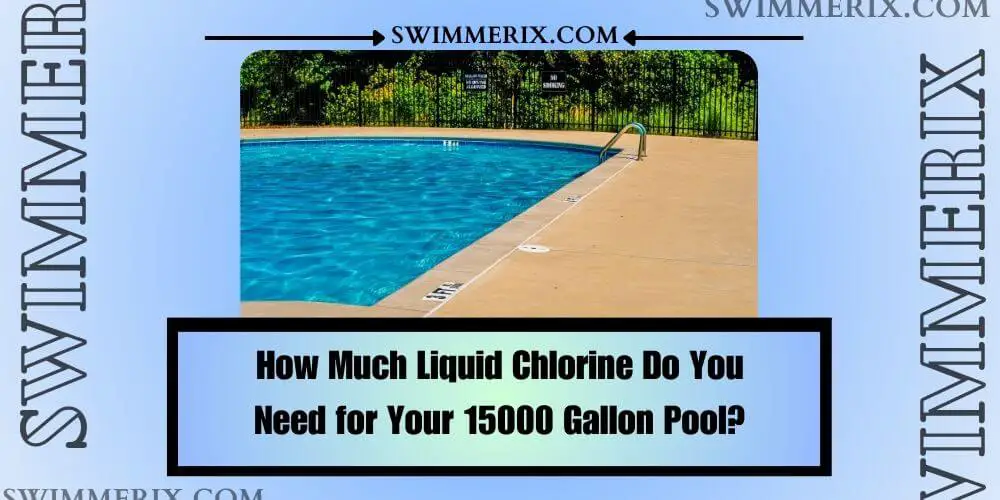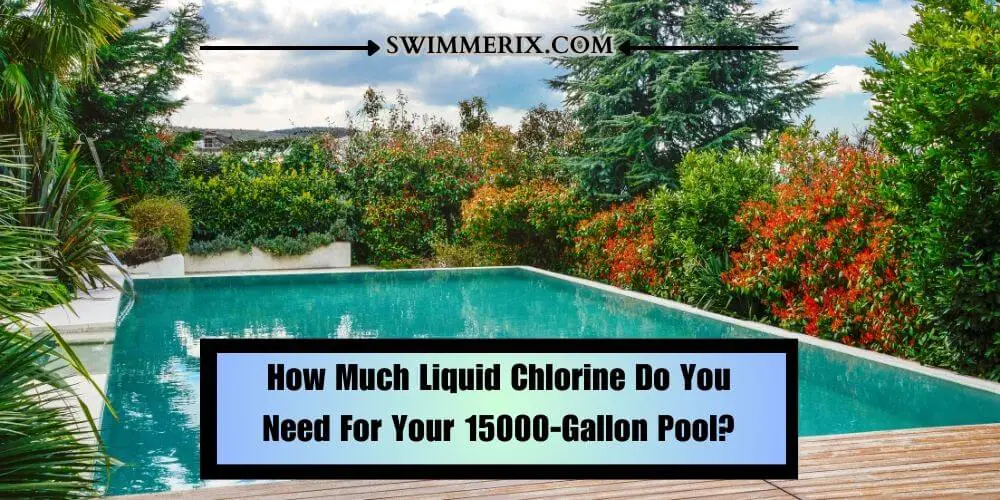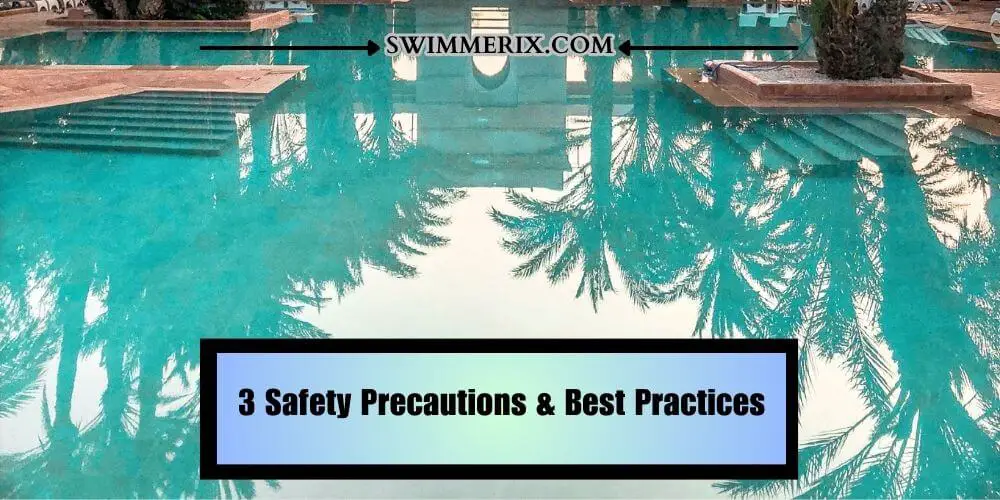
It would help if you considered all aspects of water sanitation concerning pool maintenance. However, if you have a 15000-gallon pool, you might wonder how much liquid chlorine you need to put in it to maintain a perfect pool water balance. Therefore, in this article, you will learn how much liquid chlorine you need for your 15000-gallon pool and the factors that Influence the chlorine dosage. Later on, I will also provide you with some practical tips based on real data.
We have done hours and hours of research to come up with some valuable insights into maintaining a pool at its best. Let’s take the plunge & explore the world of pool chlorination. Hence, find the answer to the question, ‘How much liquid chlorine do you need for your 15000-gallon pool’.
How Much Liquid Chlorine Do You Need For Your 15000-Gallon Pool?

You need to multiply the pool volume by the desired free chlorine residual. If you have a 15000-gallon pool, I recommend maintaining a free chlorine residual of 2.0 ppm.
When you multiply 15000 by 2, you will find that the pool’s chlorine demand is equivalent to 30000 ppm gallons. If you want to apply liquid chlorine to your pool, make sure you are pouring it slowly & evenly, especially around the perimeter while the pool pump is running, to ensure proper distribution throughout the pool water.
However, you should also note that a few factors may influence the chlorine dosage. Therefore, you should consider those to determine the amount of liquid chlorine you need for your 15000-gallon pool.
You need to determine the chlorine demand to maintain an appropriate chlorine concentration of liquid chlorine required to achieve the desired free chlorine level. We all know that liquid chlorine is commonly available in 10% or 12% concentrations.
How to calculate the dosage?
To calculate the dosage, divide the chlorine demand by the concentration percent and convert it to ounces or gallons. Below I am mentioning to you a quick example using 12.5% liquid chlorine concentration.
Chlorine dosage (gallons) = Chlorine demand (ppm-gallons) / Concentration (%)
Chlorine dosage (gallons) = 30,000 ppm-gallons / 12.5% = 2,400 gallons
Maintaining the right chlorine level in your pool is very important for a safe & enjoyable saving experience. Chlorine is a chemical element known for its powerful disinfecting properties.
Therefore when added to your pool, it usually forms a hypochlorous acid, a potent sanitizer that effectively combat harmful bacteria, viruses, and algae growth. National Institutes of Health (.gov) claims chlorine is the most commonly used disinfectant in swimming pools, with approximately 98.6% of public pools in the United States using chlorine-based sanity sanitation systems.
Hence the recommended range for a free chlorine level is typically between 1.0 to 3.0 parts per million (ppm) when combined chlorine level, whereas combined clear chlorine level must be kept below 0.2 ppm.
Also, you should note that the Centers for Disease Control and Prevention (.gov) suggests a free chlorine concentration of at least 1.0 PPM for safe swimming practices. As I told you earlier, there are also a few factors that you need to consider before determining the amount of chlorine you need to put in your 15000-gallon pool.
3 Factors Influencing Chlorine Dosage
A few factors are important to consider the amount of chlorine your pool needs, like the pool usage, environmental conditions, and water chemistry. Therefore, if you want to maintain a perfect chlorine balance in your 15000-gallon pool, you must understand these factors as closely as possible.
Pool Usage
You need to consider the number of swimmers and the frequency of pool use, which will significantly impact your pool’s chlorine demand. LaMotte Company emphasizes that heavily used pools with a high bather load need up to 1.0 PPM of additional chlorine per day.
Environmental Factors
In addition to pool usage, a few other environmental factors may influence chlorine consumption, like sunlight, temperature, & rainfall. For example, warmer temperatures or increased exposure to sunlight can lead to chlorine breakdown, meaning you must provide a higher dosage. The same goes for the rainy season when your pool will carry extra water, affecting the balance of chlorine present in it. To know more on this, read “Why Pool Won’t Hold Chlorine“
Pool Water Conditions & Testing
Ensure you pay attention to regular water testing to maintain proper chlorine levels in your swimming pool. Many studies have proven that inadequate chlorine levels can lead to waterborne illness and increased risk of recreational waterborne outbreaks.
To ensure accuracy, you should use a reliable pool water testing kit. I usually test the water at least 2 to 3 times a week. Therefore if you also want to maintain a perfect balance of chlorine in your 15000-gallon pool, test the water at least 2 to 3 times a week and pay attention to other water chemistry factors like pH, alkalinity as well as cyanuric acid levels because they can affect chlorine effectiveness tool.
The Atlas Scientific recommends keeping the pH level between 7.2-7.8 with an alkalinity between 80 & 120 PPM for optimal chlorine performance and balance in a pool.
3 Safety Precautions & Best Practices

Well, if you are considering using liquid chlorine, it is important that you also prioritize your safety to prevent accidents and ensure the well-being of swimmers. Therefore, below, I’m mentioning some safety precautions you must remember while handling and using liquid chlorine.
Handling Liquid Chlorine Safely
You should know liquid chlorine is a strong oxidizer that can cause skin & eye irritation if you mishandle it. Also, it would help if you considered wearing protective gear like gloves on your hand and goggles when handling or pouring liquid chlorine.
In addition to the protective gears, you must ensure proper ventilation in the storage Area. I don’t know about your household and family members, but if you have kids or pets, store the liquid chlorine away from their reach and other chemicals to avoid hazardous reactions. It’s best to stick with the manufacturer’s recommendation & instructions for safe storage and disposal.
Maintaining Pool Chemistry
Not only should you maintain proper chlorine level, but also ensure regular tests and balance other poor chemistry factors. As I told you earlier, you should focus on pH alkalinity and cyanuric acid level, which might impact the chlorine’s effectiveness.
Ensure you keep the cyanuric acid level between 30-50 ppm and alkalinity between 80-120 ppm. It would help if you also aimed for a pH level between 7.2 and 7.8, as I told you in the above section. With pH increaser, alkalinity level will also shoot up. To avoid this, read: How to Raise pH Without Raising Alkalinity.
As experts suggest, regular testing & adjustment will help you further optimize chlorine performance and maintain water clarity.
3 Additional Pool Maintenance Tips
Apart from considering the chlorine dosage, there are also other pool maintenance factors that you need to focus on as they help in maintaining a clean & healthy swimming environment. Therefore make sure to consider the following tips.
- You must install a reliable full filtration system & make sure it is in proper working condition. Occasionally you will also have to clean the filter regularly. Good filtration will further help you remove debris & contamination from the pool water while reducing the strain on chlorine. But if you think that your Pool Filter Not Filtering Fine Particles, consult with professional.
- Also, it would help if you considered regularly skimming the pool’s surface and brushing the walls & floor to remove leaves, insects, and algae. Algae are common issues but, make sure to use algaecides in moderation. Too Much Algaecide in Pool can be detrimental.
- It’s best to keep an eye on the water level to ensure it remains within the recommended range. Otherwise, you might have to restart the pump, leading to further damage & repeat maintenance of proper skimming.
Conclusion
I’d like to know ‘how much chlorine you need for your 15000-gallon pool’. You must maintain the right amount of liquid chlorine for a safe & enjoyable swimming experience in your 15000-gallon pool.
I have given my best to give you a proper understanding of chlorine basics and factors that may influence the dosage by following recommended practices to keep the pool water crystal clear & hygienic.
Always test your water regularly and adjust the chlorine dosage accordingly. You must also prioritize safety while handling chlorine or using liquid chlorine throughout the process. If you follow all these guidelines, I can guarantee you are well-equipped to maintain the sparkling oasis in your backyard.
I have given my best to give you in-depth knowledge on the question: ‘How much chlorine do you need for your 15000 gallon’. If you find my article helpful, then consider sharing it.
Your share will help many people learn about how much chlorine for a 15000 gallon as well as the factors that influence the chlorine level. Check my other helpful guide on pool care & maintenance shared on this website. See you in the next post, till then, take care & goodbye.
Maintaining the right amount of liquid chlorine is essential for a safe and enjoyable swimming experience in your 15,000-gallon pool. By understanding chlorine basics, considering various factors influencing dosage, and following recommended practices, you can keep your pool water crystal clear and hygienic.
Remember to test your water regularly, adjust chlorine dosage accordingly, and prioritize safety throughout the process. With these guidelines, you’ll be well-equipped to maintain a sparkling oasis in your backyard.

